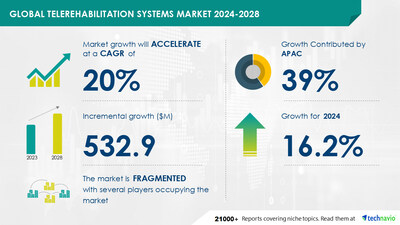Telerehabilitation Systems Market to Expand by USD 532.9 Million (2024-2028), Rising Chronic Disease Cases Driving Revenue, AI Impacting Market Trends – Technavio
Press Releases
Nov 21, 2024
NEW YORK, Nov. 21, 2024 /PRNewswire/ — Report on how AI is redefining market landscape – The global telerehabilitation systems market size is estimated to grow by USD 532.9 million from 2024-2028, according to Technavio. The market is estimated to grow at a CAGR of 20% during the forecast period. Increasing incidence of chronic diseases is driving market growth, with a trend towards advent of advanced technologies. However, complexities in implementation of internet connection poses a challenge.Key market players include BRONTES PROCESSING Sp. Z o.o. Ltd, Cisco Systems Inc., CoRehab srl, DIH Group, Evolv Rehabilitation Technologies SL, GestureTek Health, Hinge Health Inc., Honeywell International Inc., Jitrnonix, KineQuantum SAS, Kineto Tech Rehab SRL, Koninklijke Philips N.V., LiteGait, MindMaze SA, MIRA Rehab Ltd., NeoRehab, Rehametrics, Robert Bosch GmbH, SWORD Health Technologies Inc., and Tyromotion GmbH.
AI-Powered Market Evolution Insights. Our comprehensive market report ready with the latest trends, growth opportunities, and strategic analysis- View Free Sample Report PDF
|
Forecast period |
2024-2028 |
|
Base Year |
2023 |
|
Historic Data |
2018 – 2022 |
|
Segment Covered |
Product (Hardware and Software), Type (Physical therapy, Occupational therapy, and Others), and Geography (North America, Europe, APAC, South America, and Middle East and Africa) |
|
Region Covered |
North America, Europe, APAC, South America, and Middle East and Africa |
|
Key companies profiled |
BRONTES PROCESSING Sp. Z o.o. Ltd, Cisco Systems Inc., CoRehab srl, DIH Group, Evolv Rehabilitation Technologies SL, GestureTek Health, Hinge Health Inc., Honeywell International Inc., Jitrnonix, KineQuantum SAS, Kineto Tech Rehab SRL, Koninklijke Philips N.V., LiteGait, MindMaze SA, MIRA Rehab Ltd., NeoRehab, Rehametrics, Robert Bosch GmbH, SWORD Health Technologies Inc., and Tyromotion GmbH |
Key Market Trends Fueling Growth
The Telerehabilitation market is experiencing significant growth due to the increasing adoption of e-rehabilitation services. This trend is driven by the use of telecommunication networks and the internet to provide remote rehabilitation services for various disorders, including traumatic brain injury, cerebrovascular accidents, and pediatric population. Medical professionals are leveraging digital technologies such as smartphones, internet penetration, and digital health technologies to deliver clinical therapy, behavioral therapy, neurological therapy, cognitive rehabilitation, and addiction treatment. Therapy modalities like physical therapy, speech-language therapy, occupational therapy, audiology, and psychology are being offered remotely. The market includes software segments like Rehametrics, fitness programs, tele physiotherapy, and hardware like motion sensors and virtual reality. Telehealth policies, insurance coverage, and telemedicine policy reforms are key factors influencing the market. Patient engagement, continuity of care, and patient-centric care are crucial aspects of this industry, along with health data security and telecommunication infrastructure. The market caters to various healthcare settings, including homecare and healthcare facilities, and offers real-time assessment, remote patient monitoring, and virtual consultation. The aging population and chronic conditions are major drivers for the telerehabilitation market, which includes orthopedic applications, cardiovascular applications, and remote monitoring. The market also includes telehealth services, telehealth technologies, and e-visits, and is expected to grow further with the integration of AI and telecommunication technologies.
Telerehabilitation systems market is witnessing significant growth due to technological advancements such as machine learning, predictive analytics, and big data. These technologies enable personalized treatment plans and remote monitoring, making rehabilitation more accessible and efficient. Additionally, the integration of augmented and virtual reality in telerehabilitation enhances patient engagement and improves therapy outcomes. The adoption of Industry 4.0 technologies like IoT, AI, and automation in industries is also fueling the growth of telehealth solutions. These advanced technologies create connected and smart systems, providing strategic and operational advantages. Overall, the combination of telehealth and Industry 4.0 is revolutionizing healthcare delivery and improving patient care.
Insights on how AI is driving innovation, efficiency, and market growth- Request Sample!
Market Challenges
- The Telerehabilitation market, also known as E-rehabilitation, is growing rapidly as medical professionals turn to telecommunication networks and the Internet for delivering rehabilitation services. Challenges include ensuring effective diagnosis and therapy through remote communication for various disorders like traumatic brain injury, cerebrovascular accidents, and pediatric population. Digital technologies such as smartphones and internet penetration have made clinical therapy, behavioral therapy, and neurological therapy more accessible. However, engagement and continuity of care are crucial. Rehabilitation professionals use software like Rehametrics for clinical assessment and therapy modalities. Tele physiotherapy, orthopedic, and cardiovascular applications are popular. Remote patient monitoring, e-visits, and telehealth technology are key. Policymakers are addressing challenges through telehealth policy reforms and insurance coverage. Security concerns, patient satisfaction, and healthcare accessibility are ongoing issues. AI and telemedicine are transforming rehabilitation, with virtual consultation, real-time assessment, and homecare setting applications.
- Telerehabilitation systems offer numerous benefits for healthcare organizations and patients, enabling remote therapy sessions through a reliable Internet connection. However, the adoption of these systems varies based on clinical settings, patient populations, and available resources. Rural hospitals, in particular, face challenges due to limited workforce, financial constraints, and unreliable Internet connections. Internet service providers find it unprofitable to expand into rural areas, hindering the implementation of telerehabilitation services in these regions. Despite these challenges, telerehabilitation holds great potential in expanding access to healthcare services and improving patient outcomes.
Insights into how AI is reshaping industries and driving growth- Download a Sample Report
Segment Overview
This telerehabilitation systems market report extensively covers market segmentation by
- Product
- 1.1 Hardware
- 1.2 Software
- Type
- 2.1 Physical therapy
- 2.2 Occupational therapy
- 2.3 Others
- Geography
- 3.1 North America
- 3.2 Europe
- 3.3 APAC
- 3.4 South America
- 3.5 Middle East and Africa
1.1 Hardware- The global telerehabilitation systems market was dominated by the hardware segment in 2023. This segment includes head-mounted displays (HMDs), sensor motion tracking systems, and haptic devices. HMDs create the parallax effect, a depth perception phenomenon, while sensors, with gyroscopes, accelerometers, and other integral components, detect body movement. Sensory data from sensors serve as software inputs. Although hardware requires higher initial investments, it offers superior performance. The increasing demand for advanced rehabilitation platforms and systems for occupational and physical therapy, as well as robot-assisted rehabilitation, will fuel the hardware segment’s growth. Vendors provide a variety of telerehabilitation systems for home and rehabilitation center use. Given the post-acute COVID-19 phase, telerehabilitation is an effective solution, catering to patients with mild to moderate disabilities, social distancing requirements, and limited access to standard programs. These factors are anticipated to boost the global telerehabilitation systems market’s expansion during the forecast period.
Download complimentary Sample Report to gain insights into AI’s impact on market dynamics, emerging trends, and future opportunities- including forecast (2024-2028) and historic data (2018 – 2022)
Research Analysis
Telerehabilitation, also known as e-rehabilitation, refers to the delivery of rehabilitation services using telecommunication networks, particularly the internet. This innovative approach enables medical professionals to provide diagnosis, therapy, and consultation remotely for various rehabilitation needs, including physical therapy, speech-language therapy, occupational therapy, audiology, and more. Digital health technologies, such as video conferencing, mobile applications, and wearable devices, play a significant role in telerehabilitation. The market for telerehabilitation is expanding rapidly, driven by the increasing prevalence of chronic conditions and chronic diseases, the aging population, and the need for remote healthcare access. Remote communication and monitoring enable patients to receive care from the comfort of their homes, reducing the need for travel and improving healthcare accessibility. The use of software and telecommunication infrastructure facilitates virtual consultation and therapy sessions, making telerehabilitation a valuable addition to traditional healthcare services. Orthopedic applications and homecare settings are also benefiting from telerehabilitation, offering cost-effective and convenient solutions for patients.
Market Research Overview
Telerehabilitation, also known as e-rehabilitation, refers to the delivery of rehabilitation services through telecommunication networks, including the internet. Medical professionals use remote communication to diagnose and provide therapy for various disorders, such as traumatic brain injury, cerebrovascular accidents, pediatric population, and chronic conditions like osteoarthritis and drug or alcohol addiction. Therapy modalities include physical therapy, speech-language therapy, occupational therapy, audiology, psychology, and neurological therapy. Digital technologies, such as smartphones, internet penetration, and digital health technologies, enable clinical therapy, behavioral therapy, and cognitive rehabilitation. Telecommunication infrastructure, including telehealth technology, video conferencing, and mobile applications, supports remote patient monitoring, e-visits, and real-time assessment. Telehealth policies, insurance coverage, and telemedicine policy reforms impact the telerehabilitation market, which includes software and hardware segments. Patient engagement, continuity of care, and patient-centric care are essential for successful telerehabilitation. Health data security, patient satisfaction, and telehealth integration are critical considerations. Applications include orthopedic, cardiovascular, and geriatric populations in homecare settings and healthcare facilities. Artificial intelligence (AI) and virtual reality technologies are emerging trends in telerehabilitation.
Table of Contents:
1 Executive Summary
2 Market Landscape
3 Market Sizing
4 Historic Market Size
5 Five Forces Analysis
6 Market Segmentation
- Product
- Hardware
- Software
- Type
- Physical Therapy
- Occupational Therapy
- Others
- Geography
- North America
- Europe
- APAC
- South America
- Middle East And Africa
7 Customer Landscape
8 Geographic Landscape
9 Drivers, Challenges, and Trends
10 Company Landscape
11 Company Analysis
12 Appendix
About Technavio
Technavio is a leading global technology research and advisory company. Their research and analysis focuses on emerging market trends and provides actionable insights to help businesses identify market opportunities and develop effective strategies to optimize their market positions.
With over 500 specialized analysts, Technavio’s report library consists of more than 17,000 reports and counting, covering 800 technologies, spanning across 50 countries. Their client base consists of enterprises of all sizes, including more than 100 Fortune 500 companies. This growing client base relies on Technavio’s comprehensive coverage, extensive research, and actionable market insights to identify opportunities in existing and potential markets and assess their competitive positions within changing market scenarios.
Contacts
Technavio Research
Jesse Maida
Media & Marketing Executive
US: +1 844 364 1100
UK: +44 203 893 3200
Email: [email protected]
Website: www.technavio.com/
![]() View original content to download multimedia:https://www.prnewswire.com/news-releases/telerehabilitation-systems-market-to-expand-by-usd-532-9-million-2024-2028-rising-chronic-disease-cases-driving-revenue-ai-impacting-market-trends—technavio-302312036.html
View original content to download multimedia:https://www.prnewswire.com/news-releases/telerehabilitation-systems-market-to-expand-by-usd-532-9-million-2024-2028-rising-chronic-disease-cases-driving-revenue-ai-impacting-market-trends—technavio-302312036.html
SOURCE Technavio




